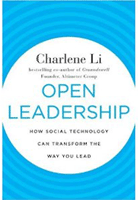** Update – if you want to know how to network well, Mary has a great guide **
One of the most popular books about the social media powered digital revolution is Groundswell, by Charlene Li and Josh Bernoff. Published in 2008, it took a private sector view of the benefits of listening to customers and engaging with them in online spaces. It’s a worthwhile read.
The two authors have subsequently published new books, though not together. What I find interesting is the fact that the follow ups (Li’s Open Leadership, and Bernoff’s Empowered) both took on the next logical step – how do you fix your organisation’s culture to make the most of the lessons of Groundswell? Again, both are a good read.
Both Li and Bernoff come to similar conclusions: an enlightened form of management is required, one which assumes competence in staff and provides them with access to the tools to do their jobs. More than anything staff need to have confidence that they are trusted by management to do their jobs.
It’s intriguing the way that both authors end up at a similar conclusion via slightly differing routes – Li focuses on leadership while Bernoff really puts staff at the centre of his book. The end result is pretty much the same, but the two books do complement one another quite nicely, and confirms my view that just a top-down or a bottom-up approach isn’t enough to change culture – you need both, in tandem.
This links in nicely with another train of thought I’ve had recently around the changing nature of work and professionalism, particularly in relation to public services. The way people work is definitely changing – both as a result of technology plus wider changes in society.
What effect does this have on the general role of the public servant? Does the traditional skill set still equip people with the abilities they need to both do their jobs well, and enhance their careers?
Two blog posts definitely worth reading around this topic are from Louise and Carl, who write about their careers in local government and how they ended up where they are.
I won’t bore you with my own backstory, but when I worked within local government it involved changing jobs regularly, not being afraid to move from authority to authority in search of promotion and new challenges, and putting a lot of after work hours into building relationships with people and being helpful through my blog.
I started making some notes on what the networked public servant looks like. It’s by no means definitive (or indeed correct!) but is a start and I would value feedback on this stuff – including what use it is and how it might be developed.
- Be networked – be comfortable meeting new people and cultivating relationships. Be happy to connect with folk online and off. Concentrate on networking with people outside your organisation as well as inside it. Get to know people, what they are good at, and connect them with others.
- Be entrepreneurial – have a strong commercial sense of value and opportunity. Be creative with the budgets you have and find new ways of improving them.
- Be inspirational – through your actions and words, be able to enthuse and motivate people to go outside their comfort zones.
- Be collaborative – understand the value of involving others in what you are doing. Be aware of your own skills and the gaps, and welcome people who can help fill them for you.
- Be creative – don’t just look to what other people have done and replicate it, but come up with your own solutions and ideas – and don’t be afraid to share them with others.
- Be risky – understand risk and how to manage it. Don’t see risk as an excuse for inactivity but as a challenge to be met head-on.
- Be bold – if you are convinced an approach is the right one to take, do so with confidence and encourage others to support you. Don’t be fearful of what others may think.
- Be human – don’t be a corporate drone. What makes you different to everyone else? Emphasise it, and make the most of it. Be someone people outside your organisation don’t mind talking to.
- Be studious – always be learning and looking out for new things to understand. Never stop looking round the corner to see what the next new thing is going to be.
- Be generous – with your knowledge and your time. Having a reputation for helpfulness is a wonderful asset.
- Be open – accept when you’re wrong, or when you aren’t sure about something. If you have half an idea, share it, and let others help out and finish it.
- Be innovative – always be on the lookout for new, better ways of doing things. Be open to new ideas, no matter where they emerge from. Develop systems and workflows for testing and implementing new ideas to ensure the best ones succeed.

 Am reading an excellent book at the moment –
Am reading an excellent book at the moment –